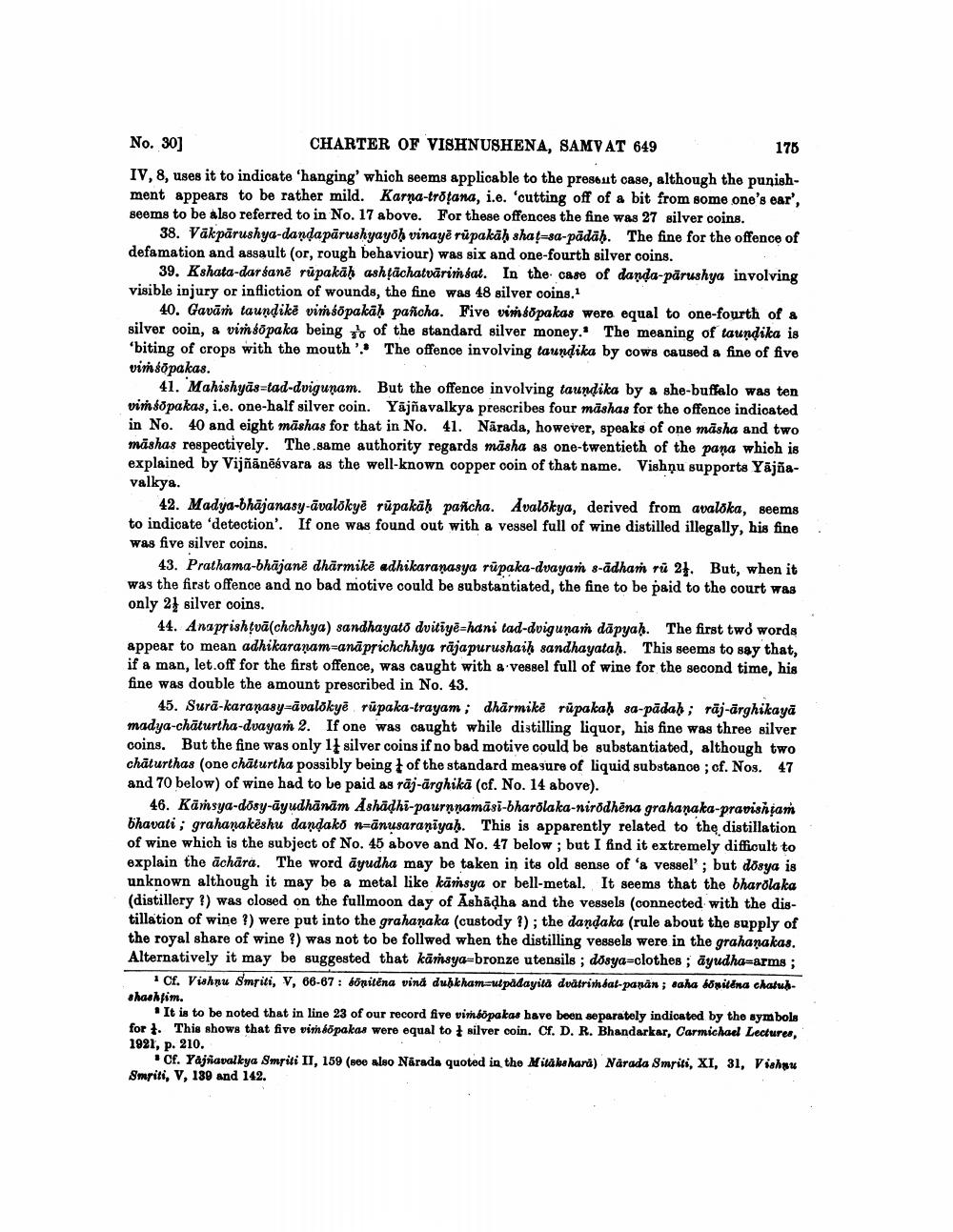________________
No. 30] CHARTER OF VISHNUSHENA, SAMVAT 649
178 IV. 8. uses it to indicate 'hanging' which seems applicable to the present case, although the punishment appears to be rather mild. Karna-trotana, i.e. 'cutting off of a bit from some one's ear', seems to be also referred to in No. 17 above. For these offences the fine was 27 silver coins.
38. Vākpārushya-danda pārushyayoh vinayē rūpakāḥ shat=sa-pădā). The fine for the offence of defamation and assault (or, rough behaviour) was six and one-fourth silver coins.
39. Kshata-darsanē rūpakāḥ ashțâchatvārim sat. In the case of danda-pārushya involving visible injury or infliction of wounds, the fine was 48 silver coins.
40. Gavā taundikë vir śöpakā) pafcha. Five vin söpakas were equal to one-fourth of a silver coin, & vimsopaka being to of the standard silver money. The meaning of taundika is "biting of crops with the mouth * The offence involving taundika by cows caused a fine of five vir sopakas.
41. Mahishyās=tad-dvigunam. But the offence involving taundika by a she-buffalo was ten vim sopakas, i.e. one-half silver coin. Yājñavalkya prescribes four māshas for the offence indicated in No. 40 and eight mäshas for that in No. 41. Närada, however, speaks of one masha and two măshas respectively. The same authority regards mäsha as one-twentieth of the pana which is explained by Vijñānēsvara as the well-known copper coin of that name. Vishņu supports Yajñavalkya.
42. Madya-bhājanasy-āvalokyë rūpakah pañcha. Avalokya, derived from avaloka, seems to indicate detection'. If one was found out with a vessel full of wine distilled illegally, his fine was five silver coins.
43. Prathama-bhājanë dhārmikë adhikaranasya rūpaka-dvayam s-adham rů 21. But, when it was the first offence and no bad motive could be substantiated, the fine to be paid to the court was only 21 silver coins.
44. Anaprishţvā(chchhya) sandhayato dvitiyê=hani tad-dvigunam dāpyaḥ. The first two words appear to mean adhikaranam-anäprichchhya räjapurushaih sandhayatah. This seems to say that, if a man, let off for the first offence, was caught with & vessel full of wine for the second time, his fine was double the amount prescribed in No. 43.
45. Surā-karanasy=āvalokyē rūpaka-trayam ; dhārmikë rūpakaḥ sa-pādah; rāj-ārghikayā madya-chäturtha-dvayarh 2. If one was caught while distilling liquor, his fine was three silver coins. But the fine was only 14 silver coins if no bad motive could be substantiated, although two chaturthas (one chāturtha possibly being of the standard measure of liquid substance ; cf. Nos. 47 and 70 below) of wine had to be paid as räj-ārghikā (cf. No. 14 above).
46. Kāṁsya-dõsy-āyudhānām Ashādhi-paurnnamāsi-bharolaka-nirodhēna grahanaka-pravishjam bhavati; grahanakeshu dandako n-anusaraniyah. This is apparently related to the distillation of wine which is the subject of No. 45 above and No. 47 below; but I find it extremely difficult to explain the achāra. The word äyudha may be taken in its old sense of 'a vessel': but dosya is unknown although it may be a metal like känsya or bell-metal. It seems that the bharðlaka (distillery ?) was closed on the fullmoon day of Ashādha and the vessels (connected with the distillation of wine ?) were put into the grahanaka (custody ?); the dandaka (rule about the supply of the royal share of wine ?) was not to be follwed when the distilling vessels were in the grahanakas. Alternatively it may be suggested that kāmsya=bronze utensils ; dosya=clothes ; ayudha=arms;
Cf. Vishnu Smriti, V, 66-67 : Sõritëna vina duhkham-utpadayita dvätrimsal-panan ; saha boritëna chatuhshashfim.
* It is to be noted that in line 23 of our record five vimböpakas have been separately indicated by the symbols fort. This shows that five vith löpakas were equal to silver coin. Cf. D. R. Bhandarkar, Carmichad Lectures, 1921, p. 210.
Of. Yajiavalkya Smriti II, 159 (see also Närada quoted in the Middle hara) Narada Smrits, XI, 31, Vishnu Smriti, V, 189 and 142.




